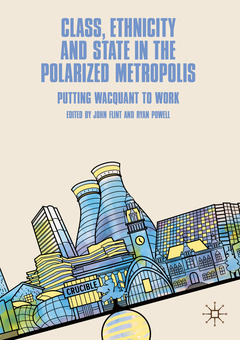Description
Class, Ethnicity and State in the Polarized Metropolis, 1st ed. 2019
Putting Wacquant to Work
Coordinators: Flint John, Powell Ryan
Language: English
Subjects for Class, Ethnicity and State in the Polarized Metropolis:
Keywords
Loïc Wacquant; urban studies; urban austerity; contemporary city; polarized metropolis; urban inequality; political sociology; theoretical pluralism; class fragmentation; ethnic division; disciplinary social policy; hyper-ghettos; marginality; racialization of poverty; national housing systems
Class, Ethnicity and State in the Polarized Metropolis
Publication date: 08-2020
Support: Print on demand
Publication date: 08-2020
Support: Print on demand
Class, Ethnicity and State in the Polarized Metropolis
Publication date: 08-2019
345 p. · 14.8x21 cm · Hardback
Publication date: 08-2019
345 p. · 14.8x21 cm · Hardback
Description
/li>Contents
/li>Biography
/li>Comment
/li>
Loïc Wacquant is one of the most influential sociological theorists of the contemporary era with his research and writings resonating widely across the social sciences. This edited collection critically responds to Wacquant?s distinct approach to understanding the contemporary urban condition in advanced capitalist societies. It comprises chapters focused on Europe and North America from leading international scholars and new emergent voices, which chart new empirical, theoretical and methodological territory. Pivoting on the relationship between class, ethnicity and the state in the (re-)making of urban marginality, the volume takes stock of Wacquant?s body of work and assesses its value as a springboard for rethinking urban inequality in polarizing times.
Heeding Wacquant?s call for constant theoretical critique and development in understanding dynamic urban relations and processes, the contributions challenge, develop and refine Wacquant?s framework, while also synthesizing it with other perspectives and bringing it into dialogue with new areas of inquiry. How can Wacquant?s work aid the empirical understanding of today?s complex urban inequalities? And how can empirical investigation and theoretical synthesis aid the development of Wacquant?s framework? The diverse contributors to the collection ask these, and other, searching questions ? and Wacquant responds to this critique in the final chapter.
This book will be of interest to scholars engaged in understanding the drivers, contexts, and potential responses to contemporary urban marginality.
1. Introduction: Putting Wacquant to Work; John Flint and Ryan Powell.- 2. Class, Ethnicity and State in the Making of Urban Marginality; Loїc Wacquant.- Part 1 – Class: Gender, Families and Surveillance.- 3. ‘We live like prisoners in a camp’: Surveillance, Governance and Agency in a US Housing Project; Talja Blokland.- 4. Maternal Outcasts: Governing Vulnerable Mothers in Advanced Marginality; Larissa Povey.- 5. Exploring Family-Based Intervention Mechanisms as a
Form of Statecraft; Emily Ball.- Part 2 – Ethnicity: Invisibilization, Informality and (Dis)
identifications.- 6. Fluid Identifications in the Age of Advanced Marginality; Fabien Truong (translated by Lorenzo Posocco).- 7. Informality and the Neo-Ghetto: Modulating Power Through Roma Camps; Isabella Clough Marinaro.- 8. Housing, Ethnicity and Advanced Marginality in England; Ryan Powell and David Robinson.- Part 3 – State: Governing Marginality—Home, Street, Neighbourhood, City.- 9. All Leviathan’s Children: Race, Punishment and the (Re-)Making of the City; Rueben Miller.- 10. Social Work and Advanced Marginality; Ian Cummins.- 11. Bringing the Third Sector Back into Ghetto Studies: Roma Segregation and Civil Society Associations in Italy.- 12. Between Street and Shelter: Seclusion, Exclusion, and the
Neutralization of Poverty.- Response.- 13. Dispossession and Dishonour in the Polarized Metropolis: Reactions and Recommendations; Loїc Wacquant.
Form of Statecraft; Emily Ball.- Part 2 – Ethnicity: Invisibilization, Informality and (Dis)
identifications.- 6. Fluid Identifications in the Age of Advanced Marginality; Fabien Truong (translated by Lorenzo Posocco).- 7. Informality and the Neo-Ghetto: Modulating Power Through Roma Camps; Isabella Clough Marinaro.- 8. Housing, Ethnicity and Advanced Marginality in England; Ryan Powell and David Robinson.- Part 3 – State: Governing Marginality—Home, Street, Neighbourhood, City.- 9. All Leviathan’s Children: Race, Punishment and the (Re-)Making of the City; Rueben Miller.- 10. Social Work and Advanced Marginality; Ian Cummins.- 11. Bringing the Third Sector Back into Ghetto Studies: Roma Segregation and Civil Society Associations in Italy.- 12. Between Street and Shelter: Seclusion, Exclusion, and the
Neutralization of Poverty.- Response.- 13. Dispossession and Dishonour in the Polarized Metropolis: Reactions and Recommendations; Loїc Wacquant.
John Flint is Professor of Town and Regional Planning and Head of the Department of Geography at the University of Sheffield, UK. He was previously Head of the Department of Urban Studies and Planning, University of Sheffield, UK.
Ryan Powell is Reader in Urban Studies in the Department of Urban Studies and Planning at the University of Sheffield, UK, with research interests in the broad areas of urban marginality, urban governance and the stigmatisation of “outsider” groups. His academic background and orientation is multidisciplinary and cuts across urban studies, sociology, geography, politics and criminology.
Provides a specific focus on class and ethnicity as elements of urban marginality Critically engages with Loic Wacquant’s work in innovative and ground-breaking ways Takes a genuinely international and interdisciplinary approach Includes contributions from both established and emerging leading urban scholars at the cutting edge of urban studies
© 2024 LAVOISIER S.A.S.
These books may interest you

Marginality and Modernity 160.25 €


